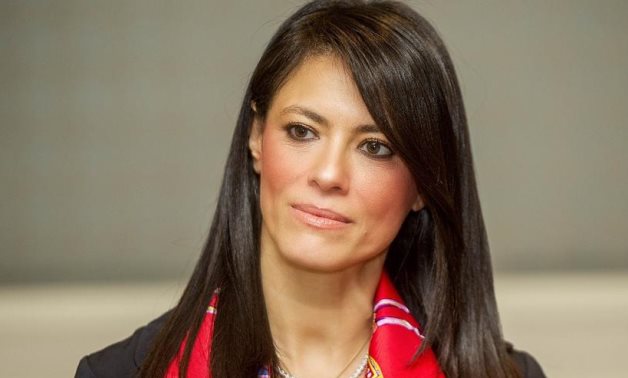
the Minister of International Cooperation H.E. Dr. Rania A. Al-Mashat
Addressing the importance of public-private partnerships to enhance financial inclusion, the Minister of International Cooperation H.E. Dr. Rania A. Al-Mashat took part in the World Economic Forum (WEF) session on “Driving Global Financial Inclusion” on September 21.
The session was moderated by Eric Parrado, Chief Economist and General Manager of the Research Department of the Inter-American Development Bank (IDB), and attended by the Chief Executive Officer of AMTD Group, Calvin Choi; and Faheen Allibhoy, the Managing Director of JP Morgan’s Development Finance Institution as panelists, alongside Al-Mashat.
Hosted alongside the United Nations General Assembly, this session is part of the WEF’s Sustainable Development Impact Summit (SDIS) held from 20 to 23 of September 2021, and aims to address building back better post-pandemic. Overall, the Summit discusses 7 main themes: 1) How to save the Planet; 2) Fairer Economies; 3) Tech for Good; 4) Society & Future of Work; 5) Better Business; 6) Healthy Futures; and 7) Beyond Geopolitics.
Al-Mashat expressed that through financial inclusion, public-private partnerships, and a strong digital infrastructure, countries will be able to progress towards the 2030 Sustainable Development Goals (SDGs), adding that through the aforementioned, economic activity will be better stimulated, leading to improved livelihoods.
“We are 9 and a half years away from the 2030 global goals, which is something that all countries, development partners and stakeholders are looking towards. When we talk about financial inclusion, this cuts across several of the SDGs...To accelerate progress towards the goals, and to ensure financial inclusion, we need to come together through partnerships,” said Al-Mashat.
Through public-private partnerships particularly, closing financial inclusion gaps is made possible through the usage of innovative technologies, alongside companies embracing the Environmental, Social, and Governance (ESG) principles. The panelists agreed that while the digital transformation is crucial, there is also a growing need for encouraging a financial regulatory framework that promotes data and consumer protection, establishing secure and reliable platforms for facilitating financial inclusion.
Choi elaborated that in the 2 past years due to the health crisis, the world has seen an unprecedented acceleration of digitalization. “Making things virtual and seamless is for the good of society...This digital transformation is not for a single-need or single-approach. Instead, this is something that the whole world requires in order to connect in a combined approach for development,” he said.
“The COVID-19 outbreak has unlocked a new perspective on the growing necessity for digital financial services, especially in a time of remote communications and social distancing. It has essentially amplified the urgency of establishing the necessary digital infrastructure,” said Al-Mashat.
The Minister added that in order to build back better towards an inclusive and resilient economy, investment in information and communications technology (ICT) and innovative financial technologies, would enable faster progress. Al-Mashat also stated that, “International cooperation plays a crucial role, especially in the form of triangular cooperation, so as to share the know-how and best practices across new technologies.”
Sharing the importance of trust, Allibhoy said that the pandemic has also enhanced contactless payment, leading to global shifts in business formation, “it all made us realize the importance of supply chains and how every aspect of life is connected to the economy,” she added.
As digitalization has reshaped the transition to sustainable development, new emerging technologies such IoT (Internet of Things), Artificial Intelligence, Big Data and Machine Learning are currently coming to the fore. In Egypt, this is exemplified by the New Administrative Capital, set to become the country’s first ever smart city, which will include a city-wide digital security system as well as a smart infrastructure to reduce consumption and cost with a focus on renewable energy using IoT.
Comments
Leave a Comment